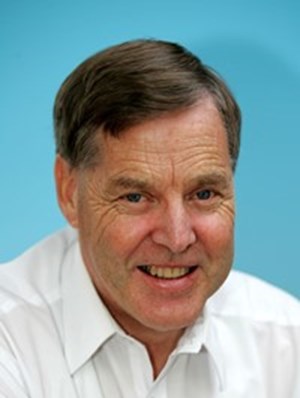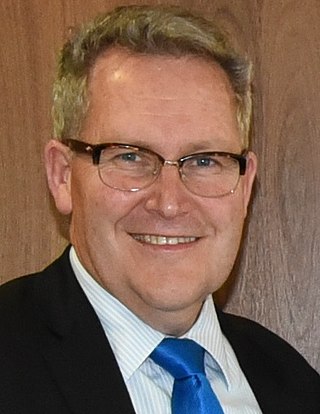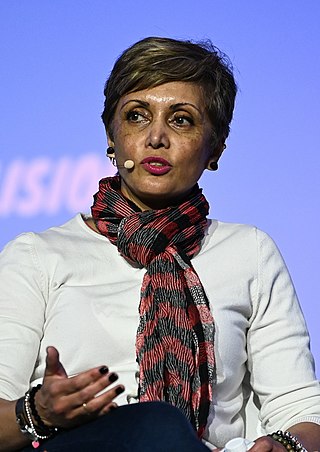
Electoral reform in New Zealand has been a political issue in the past as major changes have been made to both parliamentary and local government electoral systems.

Martin Owen Gallagher is a New Zealand politician and was Labour member of Parliament representing the Hamilton West electorate until November 2008. Currently, he is councillor on the Hamilton City Council West Ward as well as Deputy Mayor of Hamilton.
Robert Malcolm Simcock is a New Zealand politician. He was a Member of Parliament for the National Party from 1996 to 2002 and Mayor of Hamilton from 2007 to 2010.
The water fluoridation controversy arises from political, ethical, economic, and health considerations regarding the fluoridation of public water supplies.
Garry B. Mallett is a New Zealand politician. He was the fourth President of ACT New Zealand. As of 2010 he resides in Hamilton, New Zealand, and is a former owner-operator of a branch of Les Mills International there.

Timothy Harley Macindoe is a New Zealand politician who has served as a member of the Hamilton City Council for the East Ward since 2024. Macindoe was previously a Member of Parliament for the Hamilton West electorate from 2008 to 2020. He served as the Minister of Customs for the final six months of the Fifth National Government.

Water fluoridation is the controlled addition of fluoride to a public water supply to reduce tooth decay, and is handled differently by countries across the world. Fluoridated water has fluoride at a level that is proven effective for preventing cavities; this can occur naturally or by adding fluoride. Fluoridated water operates on tooth surfaces: in the mouth it creates low levels of fluoride in saliva, which reduces the rate at which tooth enamel demineralizes and increases the rate at which it remineralizes in the early stages of cavities. Typically a fluoridated compound is added to drinking water, a process that in the U.S. costs an average of about $1.32 per person-year. Defluoridation is needed when the naturally occurring fluoride level exceeds recommended limits. In 2011 the World Health Organization suggested a level of fluoride from 0.5 to 1.5 mg/L, depending on climate, local environment, and other sources of fluoride. Bottled water typically has unknown fluoride levels.
The 2011 New Zealand voting system referendum was a referendum on whether to keep the existing mixed member proportional (MMP) voting system, or to change to another voting system, for electing Members of Parliament to New Zealand's House of Representatives. It was held on 26 November 2011 in conjunction with the 2011 general election.

As with some other countries, water fluoridation in the United States is a contentious issue. As of May 2000, 42 of the 50 largest U.S. cities had water fluoridation. On January 25, 1945, Grand Rapids, Michigan, became the first community in the United States to fluoridate its drinking water to prevent tooth decay.

The 2013 New Zealand local elections were triennial elections to elect local government officials and District Health Board members, and the membership of other local bodies such as Licensing Trusts. All elections were conducted by postal ballot, with election day being Saturday 12 October 2013.

Australia is one of many countries that have water fluoridation programs currently operating. As of March 2012, artificially fluoridated drinking water is administered to 70% or more of the population in all states and territories. The acceptance of the benefits of water fluoridation occurred in Australia in December 1953, roughly two years after acceptance in the United States. Many of Australia's drinking water supplies subsequently began fluoridation in the 1960s and 1970s. By 1984 almost 66% of the Australian population had fluoridated drinking water, represented by 850 towns and cities. Some areas within Australia have natural fluoride levels in the groundwater, which was estimated in 1991 to provide drinking water to approximately 0.9% of the population.

Hamilton City Council is the territorial authority for the New Zealand city of Hamilton.
The 2013 Hamilton mayoral election was part of the Hamilton and wider New Zealand local elections. On 12 October 2013, elections were held for the Mayor of Hamilton and other local government roles. The incumbent, Julie Hardaker, ran against seven other candidates and was re-elected with 43.6% of the vote, a 2,911-vote majority over Ewan Wilson who won 35.5%.

The 2016 New Zealand local elections were triennial local elections to select local government officials and District Health Board members. Under section 10 of the Local Electoral Act 2001, a "general election of members of every local authority or community board must be held on the second Saturday in October in every third year" from the date the Act came into effect in 2001, meaning 8 October 2016.
The 2013 Rangitikei local elections were held across the Rangitikei District of Manawatū-Whanganui, New Zealand, for the offices of Mayor of Rangitikei and eleven members of the Rangitikei District Council on 12 October 2013. They were held as part of the 2013 New Zealand local elections. Postal ballots were issued to 9,866 registered voters, and were returned from 23 September to 12 October. Across the district, 4,856 people cast votes, a voter turnout of 49.22%. Some voters chose not to vote in particular elections or referendums, so voter turnout in individual elections varies from this figure.

The 2016 Hamilton City mayoral election is part of the New Zealand local elections and held to determine the next mayor of the Hamilton City Council. The incumbent Julie Hardaker, who was first elected in the 2010 mayoral election did not stand for re-election. Confirmed candidates included current Waikato Regional Council chair Paula Southgate, East Ward Councillor Rob Pascoe, West Ward Councillor Andrew King, and former business manager at Hamilton City Council Chris Simpson. Andrew King won with a nine-vote margin, amended to 6 votes in a recount.

The 2021 Calgary municipal election was held on October 18, 2021, to elect a mayor and fourteen councillors to the Calgary City Council.
The 1998 Calgary municipal election was held on October 19, 1998, to elect a Mayor and 14 Aldermen to Calgary City Council.
The 2022 Hamilton mayoral election took place on 8 October 2022 to determine the Mayor of Hamilton, New Zealand. For the first time, the election was held under the single transferable vote system. Incumbent mayor Paula Southgate was re-elected.

Ryan Alexander Hamilton is a New Zealand politician. He has been the Member of Parliament for Hamilton East representing the National Party since the 2023 general election. He was a Hamilton city councillor from 2018 until resigning following his election to Parliament.









